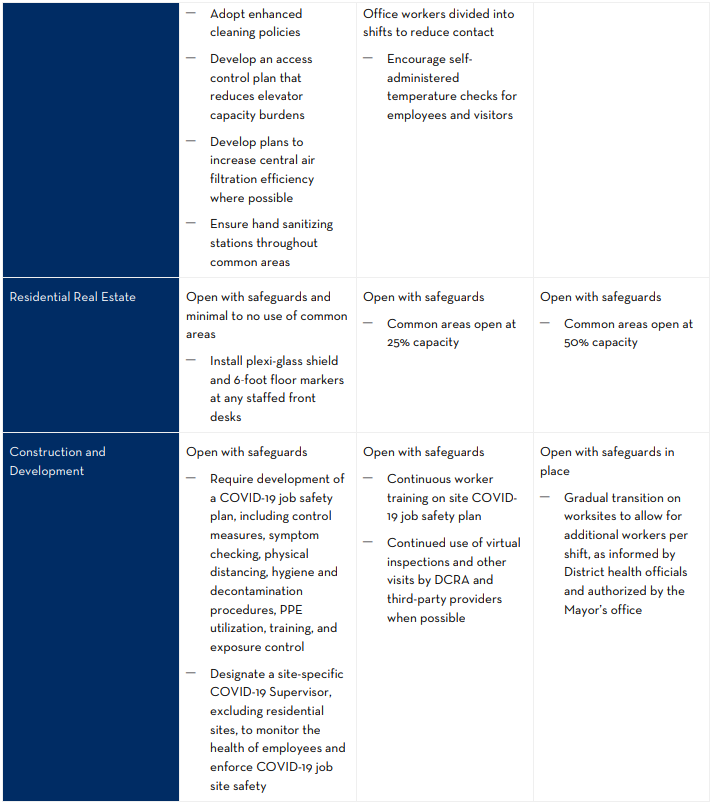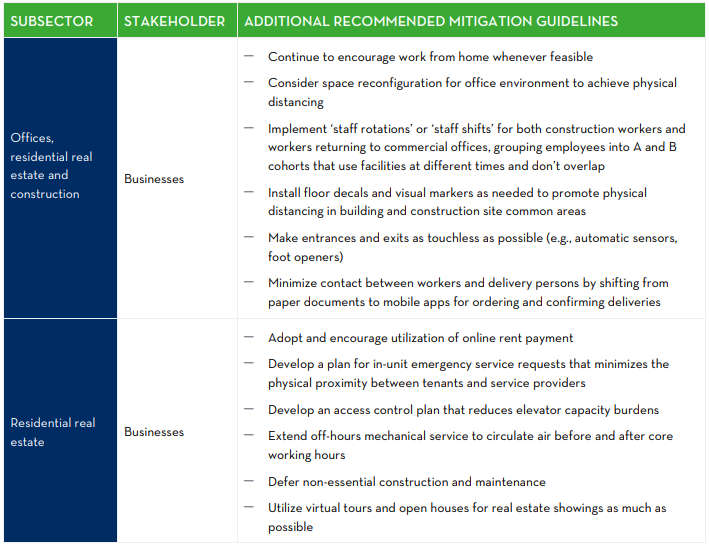Title Page
-
Client/Site
-
Date
-
Prepared by
-
Location
REAL ESTATE AND CONSTRUCTION COMMITTEE
STAKEHOLDER ENGAGEMENT
-
The Real Estate and Construction committee represented leading voices in its membership, consisting of housing community builders, affordable housing advocates and practitioners, commercial owners, property managers, union leaders, and construction and legal professionals. The committee also incorporated resident feedback from the ReOpen DC Survey, which had approximately 17,000 total responses and nearly 1,200
comments. Two recurring concerns from survey respondents included:
1) Landlords, tenants, and homeowners alike are concerned about individuals and businesses being able to pay rent and mortgages
2) Respondents are looking to the District government for clear guidelines and training on how construction sites and contractors should be operating during the pandemic.
The committee echoes these concerns and sought to deliver practical, clear guidelines for implementing safeguards not only within the construction and contracting space but across the real estate and construction sector based on industry best practice and expert advice. The committee also recommended the expansion of the Emergency Rental Assistance Program (ERAP), a solution also provided by numerous residents, as a near-term policy solution to assist renters impacted by COVID-19.
In addition to the feedback gathered from the public survey and the 25 committee members, the committee engaged 27 external individuals and organizations for reopening guidance and recommendations, including affordable housing developers and advocates (e.g. Coalition for Nonprofit Housing and Economic Development Support Housing Working Group, Jubilee Housing, Housing Up), area construction companies (e.g., Clark Construction, MCN Build, Turner Construction, Smoot Construction), worker groups (North America’s Building Trades Unions, SEIU32BJ, National Association of Minority Contractors), and industry professionals from AECOM, Gensler, Urban Atlantic, and ASHRAE.
The committee also received guidance and input on the recommended guidelines and broader report from District agency representatives from the Department of Housing and Community Development (DHCD), the District of Columbia Housing Authority (DCHA), and the Department of General Services (DGS).
STAGING RECOMMENDATIONS
-
In addition to the report’s primary guidance and universal safeguards (e.g., physical distancing of at least six feet, use of masks in public spaces, stringent sanitation, and hygiene practices) the Committee proposes the following guidance for the subsectors listed below:
-
RECOMMENDED SAFEGUARDS
-
The committee also recommends adoption of the sub-sector specific universal safeguards outlined below:
OTHER RECOMMENDATIONS AND ‘BIG IDEAS’
-
The Committee and its members have identified several additional initiatives and ideas for consideration, which include:
-
– Recommend the provision of hazard pay to vulnerable workers that cannot telework (e.g. security guards, cleaning staff, building maintenance, etc.)
-
– Implement on-site testing facilities for construction sites with >150 workers
-
– Consider regulatory changes including adoption of virtual inspections and permitting processes, and resolution of indemnification concerns for employers, landlords and building managers
-
– Consider establishing and expanding rent and mortgage assistance programs for low-income residents experiencing COVID-related financial hardship
-
– Encourage offering of monthly payment plan options for residential tenants and housing providers as well as between multi-family housing providers, tenants, and utility companies
-
– Facilitate adoption of physically-distant transportation options for construction and office workers who cannot work from home, including free memberships to Capital Bikeshare, subsidies for taxis and additional bicycle parking
-
– Designate ‘Health Ambassadors’ as points of contact for real estate and construction businesses, responsible for developing and maintaining health and safety policies, coordinating with District government officials, and collaborating with industry counterparts to ensure internal policies align and are constantly evaluated as restrictions are relaxed or intensified
-
– Develop creative incentive structures for the conversion of existing vacant or under-utilized office or parking garages into facilities for light manufacturing, storage or distribution
COMPLETION
-
Addtional Notes
-
Sign Off



















